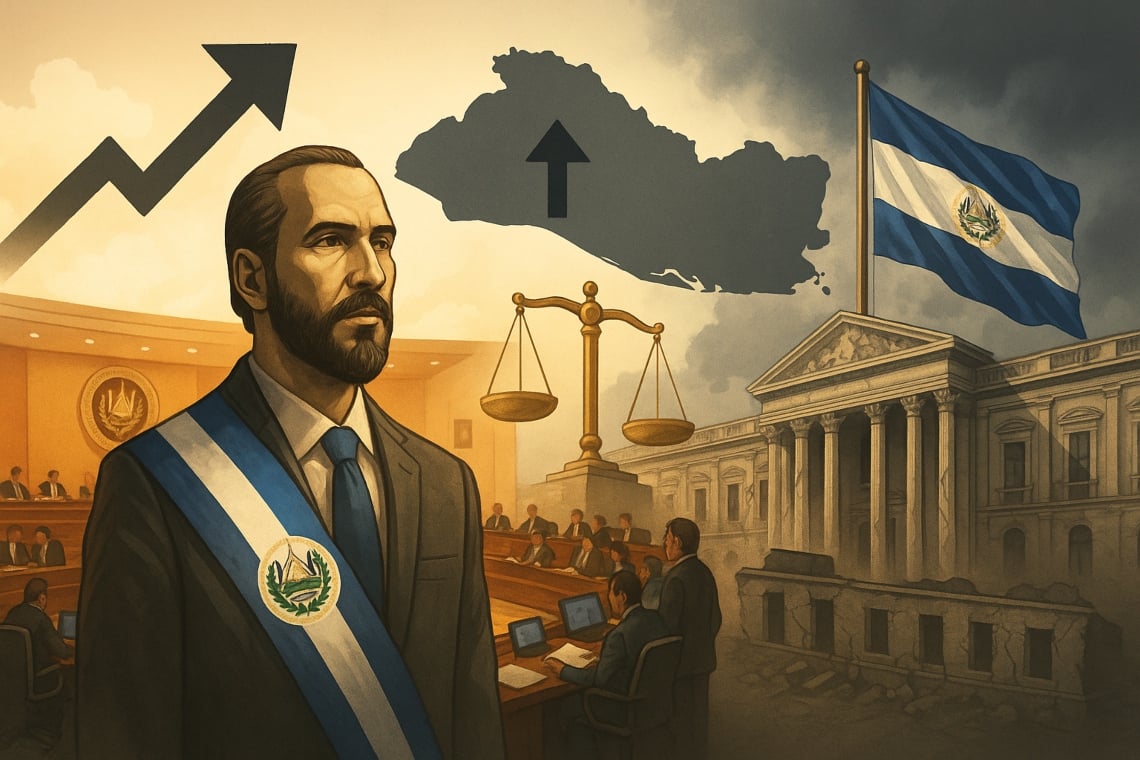In July 2025, El Salvador approved a constitutional reform that profoundly alters the democratic balance. The extension of the mandate and the abolition of the re-election limit ignite the debate on the future of the Central American country.
A radical change: more power to the president, fewer checks for El Salvador
With 56 votes in favor out of 60, the Parliament dominated by the government coalition has given the green light to an unprecedented reform that:
- Extends the presidential term from 5 to 6 years
- Abolishes the limit on consecutive terms
- Confirms the single-round electoral system
- Weakens the control bodies and the institutional counterweights
According to the Organization of American States (OAS), it is one of the most significant transformations of recent decades in Latin America.
An analysis by International IDEA notes a progressive weakening of the balance between powers.
Many observers openly speak of an excessive concentration of power in the hands of President Nayib Bukele.
Opposition deputy Marcela Villatoro has defined the reform as “the end of democracy,” raising concerns related to:
- Corruption and nepotism
- Limitations to political participation
- Control over media and opposition
Even Freedom House highlights a deterioration in the country’s democratic indicators.
| Institutional characteristic | Before (until 2025) | After the reform |
| Presidential term duration | 5 years | 6 years |
| Limit on consecutive terms | 2 | None |
| Electoral round | Double (with runoff) | Single |
| Control bodies | Independent | Reformed with reduced powers |
Electoral synchronization: strategy or savings?
Another discussed element is the proposal to align the presidential and legislative elections to 2027. According to parliamentarian Anna Figueroa, this choice would allow a saving of about 50 million dollars per electoral round.
The funds would be redirected towards healthcare and education. But for many analysts, it is a political move to consolidate support.
The removal of term limits and the increasing control over the press and opposition have alerted the international community.
Amnesty International highlights worrying signs: arbitrary arrests, judicial pressures, and a repressive climate.
Despite the criticisms, Bukele continues to enjoy broad support. A survey by CID Gallup finds an approval rate of over 90% in 2024.
Suecy Callejas, vice president of the Legislative Assembly, defends the reform as a choice “desired by the people”.
Bitcoin and digital diplomacy: Bukele looks to the future
While internal controversies rage, the president continues to focus on the digital economy.
El Salvador holds over 6,200 Bitcoin, but from the IMF report it emerges that no new official purchases have been made since December 2024.
In the meantime, the government has signed a memorandum with Bolivia to collaborate on blockchain and cryptocurrencies, as reported by MIT Technology Review.
| Year | Bukele Consensus | Political Freedom (Freedom House) |
|——|——————|———————————-|
| 2020 | 74% | 61/100 |
| 2022 | 82% | 54/100 |
| 2024 | 91% | 49/100 |
| 2025 | 93% | 42/100 |
El Salvador is at a crossroads. The institutional reform could bring stability and coherence, but at the cost of a drastic reduction of democratic guarantees.
The challenge in the coming years will be to understand if this model will produce sustainable results or if it will drag the country towards an authority without checks and balances. The world watches, and history will judge.
